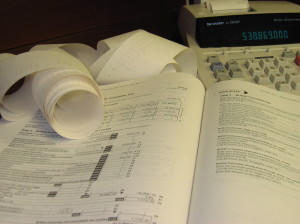 Meals and entertainment expenses are one of my favorite types of deductions because they can eliminate tax. By turning your current non-deductible expenses into legal tax deductions, you are effectively eliminating tax by permanently reducing your taxes with these deductions.
Meals and entertainment expenses are one of my favorite types of deductions because they can eliminate tax. By turning your current non-deductible expenses into legal tax deductions, you are effectively eliminating tax by permanently reducing your taxes with these deductions.
This permanent tax saving strategy only works when the meals and entertainment expenses are protected by keeping proper documentation.
One thing you can always count on during an audit is a request for documentation supporting deductions for meals and entertainment expenses.
The government has found that these deductions are heavily abused and are an easy way to generate additional tax revenue, not to mention additional revenue from penalties and interest.
While I’m focusing on a U.S. tax perspective, the concept applies in most developed countries.
You don’t have to spend a lot of time reading U.S. tax cases to find one where meals and entertainment expenses were disallowed specifically because of improper documentation. Here are a few examples from tax cases:
Example 1:
The taxpayer’s business meal expenses did not satisfy the substantiation requirements because they did not include the taxpayer’s relationship to the parties involved or specify the business purposes of the meals.
Example 2:
The taxpayer’s meals and entertainment deductions were disallowed because the taxpayer couldn’t provide anything to tie the deductions to specific copies of receipts, checks, or other documents. Plus, in the few records the taxpayer did provide, there were duplications and other irregularities in the records making them unreliable altogether.
Example 3:
A spreadsheet listing the numbers the taxpayer put on his return was insufficient to substantiate or use to reconstruct business expenses for meals and entertainment.
This means that even if a meal or entertainment expense is perfectly legitimate, it can be disallowed if the documentation is not proper.
How to Protect Your Deductions for Meals and Entertainment Expenses
Here is a checklist to use for each meal and entertainment expense to make sure these deductions are well protected:
____ Amount of each separate expense
____ Description of each separate expense
____ Date of expense
____ Location of expense
____ Business purpose of expense
____ Names and business relationship of the people involved
How to Simplify Your Documentation
It may seem like quite a bit for each and every meal and entertainment expense, but here are a few ways to make this process very simple:
Get a receipt. The first 4 items – amount, description, date and location – are usually printed on the receipt. Then simply write the remaining 2 items – business purpose, names and business relationship on the receipt.
Scan your receipt. I always recommend scanning your receipts so you have an electronic copy. Many receipts tend to fade in just a year so your documentation could disappear. A scanned copy won’t fade and can help reduce the clutter of receipts.
If you don’t get a receipt, then document all of the items listed above (either write them down or type them up) and then attach support for the payment. Here are a few examples:
If you paid by check, attach a copy of the check and your bank statement showing it cleared your bank account.
If you paid by debit or credit card, attach a copy of your bank or credit card statement showing the debit or charge.
If you paid by cash, try your best to get a receipt. Otherwise, make sure your documentation is precise and make sure a very small percentage of your expenses fall into this category of paid by cash and no receipt.
Important Final Tip
Don’t force it! If a meal or entertainment expense doesn’t meet the business purpose requirement because it was a personal expense, then don’t deduct it.
If an auditor finds personal expenses being deducted, then all of your other expenses will be heavily scrutinized, putting your legitimate deductions at risk for the slightest reason.
If you want to learn more about how to take advantage of these tax strategies; sign up on our web site or email us for an appointment to get started today.




 A wealth strategy shouldn’t be a big “to-do” hanging over your head. Instead, it should be something you integrate into your everyday life over time.
A wealth strategy shouldn’t be a big “to-do” hanging over your head. Instead, it should be something you integrate into your everyday life over time.

